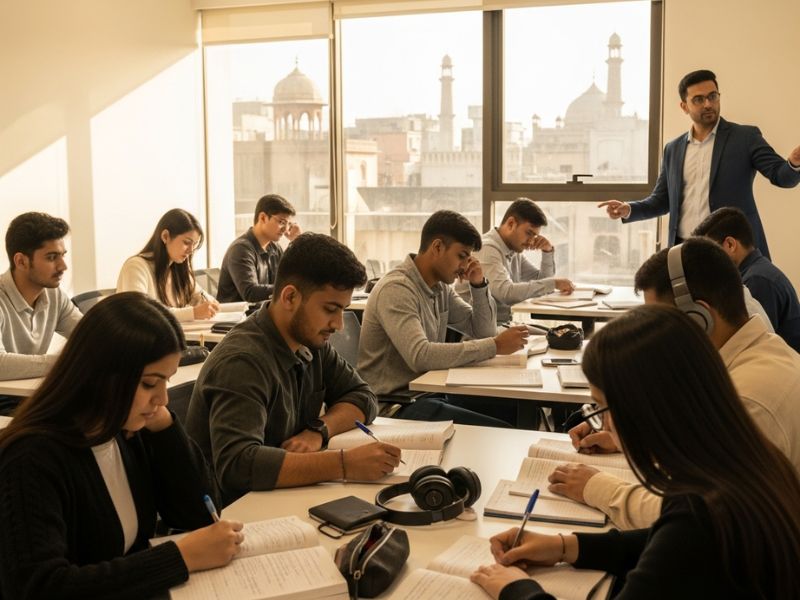Australia is yet another promising choice for international students, famous for its elegant system of education, a lively multicultural spirit, and an above-average standard of living. Australian universities are listed among the best in the world, hence providing students with world-recognized degrees. Australia offers, there is a wide array of courses to choose from, with modern campuses and strong student support services for international students. The country's safe cities, stunning landscapes, and warm communities add to its charm as a place for living and studying. Apart from these, part-time job opportunities and postgraduate work visa facilities also help draw valuable experience and make the country an added attraction to study and work. Enrolling in Personal Development Courses can help with a smoother experience.
Key Advantages of Studying in Australia:
The benefits of choosing Australia for higher studies:
·
High-Quality Education: Top-ranked
universities and globally recognized degrees ensure that Australia provides
excellent academic training to its students in various disciplines.
·
Different and Flexible Courses: Students
can select courses that are broadly geared toward the career they wish to
pursue, with applied research, internships, and practical coursework thrown in
there somewhere.
·
Post-Study Work Opportunities: Through
post-study work visas, graduates can stay and work in Australia and gain
meaningful international work experience.
·
Balance between Study and Life: Australia
means quality of life, a part-time job, beautiful nature, and cities to
explore.
Things you should know before studying in Australia (2025)
The latest updates to know before you study in Australia:
·
Increase in Visa Application Fees: From
2025, the fee for student visa applications increased to AU$ 1600, which is
more than in earlier years. Make sure to accommodate this change in your
budget.
·
Higher English Language Requirements: The
student visa applicant's minimum IELTS score has been raised to 6.0. Some
particular programs require even higher scores.
· Changes to Temporary Graduate Visa (Subclass 485): The applicant's age limit for many visa types has been dropped to 35 years in the case of the Temporary Graduate Visa.
The Best Courses to Study in Australia:
Some of the favorite courses that people can get more in
Australia are:
•
Business and Management
•
Engineering and Technology
•
Information Technology (IT)
•
Health and Medical Oceania
•
Hospitality and Tourism Management
•
Accounting and Finance
• Environmental Science and Sustainability
The Best Universities in Australia:
Choose from these the best universities for the best knowledge and a stable future:
1.
University of Melbourne: Excellent
research with world number one ranking and varied programs with stronger
academic support and value for career-focused education in Melbourne.
2.
Australian National University (ANU): Australia's
top-ranked university noted for research as well as with international outlook,
and strong programs in politics, science, and humanities.
3.
University of Sydney: Prestigious degrees
offered: law, business, and medicine, beautiful campus, and great industry
connections all based in the centre of Sydney.
4.
University of Queensland (UQ): Leading
research university strong in science, health, and engineering based in the
most student-friendly city-Brisbane.
5.
University of New South Wales (UNSW): Highly
reputed for engineering, business, and innovation, with strong links to the
industry and practical learning, has focus in Sydney.
6.
Monash University: Globally recognized in
Melbourne, Monash will be comprising diversified programs and superb research
facilities and international campuses for global exposure.
7. University of Western Australia (UWA): Located in Perth, UWA excels in life sciences, engineering, and environmental studies with a robust research orientation complemented by a stunning campus.
The Best Time to Take Admission in Australia
Australia has three major intakes for international
students, which are February, July, and November. The February intake is the
one with many students, has a broad spectrum of courses, and should be
submitted by October-November of the prior year. July intake will be the second
choice for those students who failed to fill the gap with the first intake.
Applications have to be done by March-April. A November intake is also present
in a few universities for limited courses, with due dates of around
August-September. It's advisable to apply earlier to get a seat and finish the
visa process on time.
The Best Scholarships:
Australia presents a wealth of scholarship opportunities to
international students. Some of the most recognized ones are:
•
Australia Awards Scholarships: These are
scholarships granted by the Australian government that cover tuition, living
costs, and travel expenses for students from developing nations.
•
Endeavour Scholarships and Fellowships: Enabling
international students to study, research, or gain professional experience in
Australia.
•
University-Specific Scholarships: Most
universities such as the University of Melbourne, UNSW, and ANU have
merit-based scholarships available for international students which can either
be partial or full tuition fee paying.
•
Research Training Program (RTP) Scholarships:
Postgraduate, covering tuition fees and providing a stipend for living costs.
•
Destination Australia Program: This is an
attractive program that encourages international students to study in regional
Australia, with great funding for tuition and living costs.
The Cost of Studying in Australia:
Studying in Australia can be a flexible venture depending on
the course, institution, and lifestyle for the learner. Typical costs are as
follows:
1.
Tuition Fees: Undergraduate Programs
costs AUD 20,000- 45,000 per year and Postgraduate Programs costs AUD
22,000-50,000, depending on the course and university.
2.
Living Costs: International students are
estimated to spend about AUD 20,000 to AUD 27,000 per year, depending on what
the expenses may include accommodation, food, transport, and personal expenses.
3.
Health Insurance: The Overseas Student
Health Cover (OSHC) is compulsory and costs about AUD 500 to AUD 600 per annum.
4.
Other Expenses: Additional expenses
include textbooks, supplies, and travel ranging between AUD 1,000 and $2,000
yearly.
In total, that could account for anything from AUD 40,000 to AUD 70,000 for a given year, based on your course and location.
Secure Admission with Experts: GlenEagles School, The Best IELTS Coaching Centre
GlenEagles School is the best IELTS coaching centre recognizes
that many factors are at play in the admission procedure, as well as the
challenges that international students encounter. Hence, our working experts
are entirely dedicated to offering personalized guidance to secure admission in
top universities in Australia. Our support is end-to-end, beginning from course
selection to visa application guidance. We ensure that your application stands
out to give you a better chance of success through Personal Development Courses.
Let us simplify your journey to study in Australia.
Contact GlenEagles School, IELTS Coaching Centre, today to
start your application process and take the first step towards a brighter
future!





